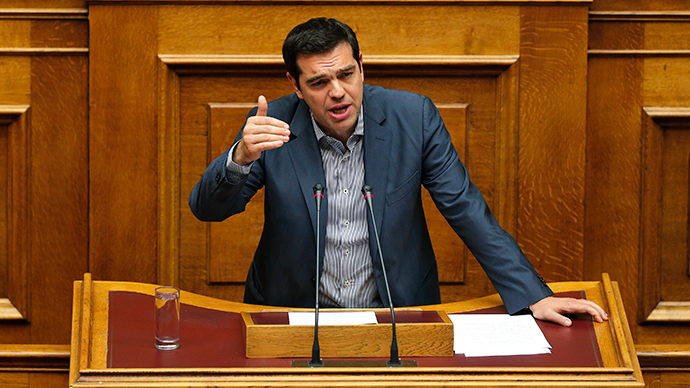‘Agree or go bust’: Tsipras explains, defends ‘bad’ bailout deal ‘imposed’ on Greece

During a TV speech, Greek Prime Minister Alexis Tsipras admitted that he “does not believe in” the bailout deal with European creditors. However, he defended the venture by arguing that the “bad” deal was the only way for Greece to stay in the EU.
READ MORE: IMF: Greek debt ‘unsustainable,’ Europe should give relief – report
During the negotiations in Brussels, Greece was forced to choose between accepting an agreement with its creditors and bankruptcy followed by an exit from the euro, Tsipras said in a live interview with the Hellenic Broadcasting Corporation (ERT).
The speech comes right before Wednesday’s parliamentary session in Athens, where all the measures Tsipras agreed upon need to be passed if the deal is to kick in.
The leader of the ruling Syriza party called the negotiations “a bad night for Europe” as there had been only two options for Greece during the Eurogroup talks – either to agree to its creditors’ tough terms or go bankrupt, which would have meant leaving the eurozone for an uncertain future.
READ MORE: No to ‘EU colony’: Tsipras faces opposition from govt & people against bailout deal
“The hard truth is this one-way street for Greece was imposed on us,” the Greek prime minister said referring to the negotiation process.
Tsipras is now facing great discontent over the agreement within his own ruling party, with increasing concern over whether his fellow MPs will back the deal. However, the prime minister maintains that he will not abandon Greece and will ride out his full four-year term.
“The worst thing a captain can do while he is steering a ship during a storm, as difficult as it is, is to abandon the helm,” he said. “I won’t escape these responsibilities and will try to implement my political program over a four-year period.”
The new deal imposed strict structural reforms but was not “an absolute deadlock” as was the case with the “June 25 ultimatum,” Tsipras revealed.
“I strived with heart and soul for everything that could possibly be done in that situation,” he said, adding that the agreement envisaged “de-facto debt restructuring” as well as commitments concerning “debt adjustment” for the period after 2021.
One of the main points Tsipras said he fought for was avoiding cuts in wages and pensions. He stressed that the fiscal adjustment foreseen by the new deal was “milder” than the one that the Greeks had previously rejected.
The deal’s provisions include putting aside €25 billion for the recapitalization of Greek banks. However, Tsipras emphasized that Greek banks would only need €10-15 billion.
READ MORE: Athens extends ‘bank holidays’ as ECB keeps its emergency aid limit unchanged - source
Another aspect of the deal is ‘fresh money’ that countries like Finland and the Netherlands have been hesitant to provide. “To be frank, here, they are not only forced to give fresh money, but to give 82 billion, and are accepting the restructure of debt,” Tsipras said.
The prime minister also emphasized that the EU’s negotiating stance during the talks “did not reflect well on Europe,” though acknowledging that the negotiations “had been easy to no one.”
Tsipras openly admitted that the agreement was “complicated and bad in several aspects,” but at the same time he claimed “the budget consolidation would now go easier.”
Despite expressing uncertainty that he will be able to get the Greek parliament to pass all the required reforms by the end of Wednesday’s session, Tsipras expressed confidence in the venture, putting his reputation on the line.
“I am fully assuming my responsibilities, for mistakes and for oversights, and for the responsibility of signing a text that I do not believe in, but that I am obliged to implement.”












